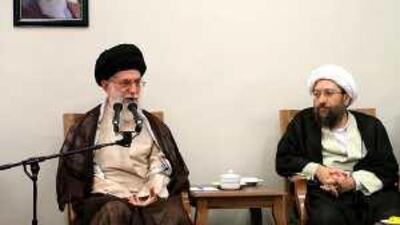TEHRAN // Iran's new chief justice began work yesterday facing the daunting task of dealing with the politically charged trials of those accused of involvement in the unrest that followed the presidential elections in June. Hojjatol Eslam Sadegh Larijani's first day featured the third mass court action against those facing charges linked to massive demonstrations that erupted after President Mahmoud Ahmadinejad's disputed re-election.
Twenty-seven men and one woman appeared in court yesterday accused of a range of offences including participation in illegal rallies, vandalising public property and "hurting" members of the security forces. But unlike the two earlier trials there were no high-profile individuals or politicians among the defendants. Mr Larijani was appointed to a five-year term on Saturday by supreme leader Ayatollah Seyed Ali Khamenei, who said he hoped Mr Larijani would use his expertise and experience to make the justice system "flourish".
Mr Larijani, a hardliner, has been a member of the Guardian Council, which oversees elections and endorses the legislation made by the parliament, since 2004, and a member of the Assembly of Experts that chooses and supervises the work of the country's supreme leader. The Najaf-born cleric is a member of the influential Larijani family and the son of Ayatollah Hashem Amoli. His family returned to Iran in the early 1960s after nearly three decades of living in the holy city of Najaf in Iraq.
Of the country's three branches of governments - judiciary, legislative and executive - two are now headed by Larijani brothers, the other being Ali Larijani, the parliament speaker. A third brother, Mohammad Javad Larijani, is a high-profile politician and former deputy foreign minister. Mr Larijani, 49, had long been considered as the favoured candidate for the post, but recently there had been rumours he declined to take over the judiciary before the end of the trials of opposition figures and those involved in post-election protests. Although a cleric, Mr Larijani is more well known for his political activities.
The new chief justice succeeded Ayatollah Seyed Mahmoud Hashemi Shahroudi, who served two five-year terms. Ayatollah Shahroudi was recognised as an ayatollah, a high-ranking cleric, by the Shiite seminaries of Qom and Najaf before being appointed to the position of chief justice. Mr Larijani is, however, still considered of a lower clerical rank (Hojjatol Eslam). Mr Larijani has had conventional education in addition to his seminary studies and has taught comparative philosophy and discourse in religious schools.
He is a proponent of the theory of the so-called "cultural onslaught of the West". He is expected to make considerable changes in the structure of the Judiciary Force, replacing some of the older and more traditionalist clerics and judges with a new and younger generation of hardliners. However, some analysts believe his appointment may help to modernise the Judiciary Force in matters of administration and logistics.
His traditionalist predecessor, Ayatollah Shahroudi, had tried to use his powers as chief justice to exercise clemency in a number of controversial cases, including holding or overturning the rulings of some courts in cases of capital punishment and stoning. Mr Larijani is expected to be less lenient. He will face other challenges in the coming days besides the trials related to post-election unrest. A trial of seven members of the Bahai community on the charges of spying for Israel is scheduled for tomorrow. Most of the defendants in the case have been in jail for more than a year. Bahaism is considered an illegal religion in Iran.
The Judiciary Force also has a backlog of eight million cases. At the beginning of his first term Ayatollah Shahroudi had complained of having inherited a "wreck" and had 4m cases to handle. Allegations of jail rape and torture by the defeated reformist candidate Mehdi Karrubi that have rocked the Iranian society are also among the issues that the new chief justice will have to deal with. The allegations have been denied by hardline and conservative officials, including Ayatollah Shahroudi who, in a letter to Mr Karrubi, said "nothing of the kind has happened in detention facilities under the supervision of the Judiciary Force".
Ali Larijani, the parliamentary speaker, last week called the allegations "sheer lies". He will also oversee the trial of 12 law enforcement officers and a judge who issued the order to transfer those arrested during street protests to Kahrizak detention facility. The centre was ordered closed by Ayatollah Khamenei after the death of the son of a high-profile government official, who was being held in the facility, was reported nearly three weeks ago.
But his greatest task will be the trial of about 110 people facing charges from protests against the June 12 poll, which returned Mr Ahmadinejad to power amid fraud allegations by the opposition. The defendants include top reformists and political activists as well as two employees of the French and the British embassies. msiniaee@thenational.ae

